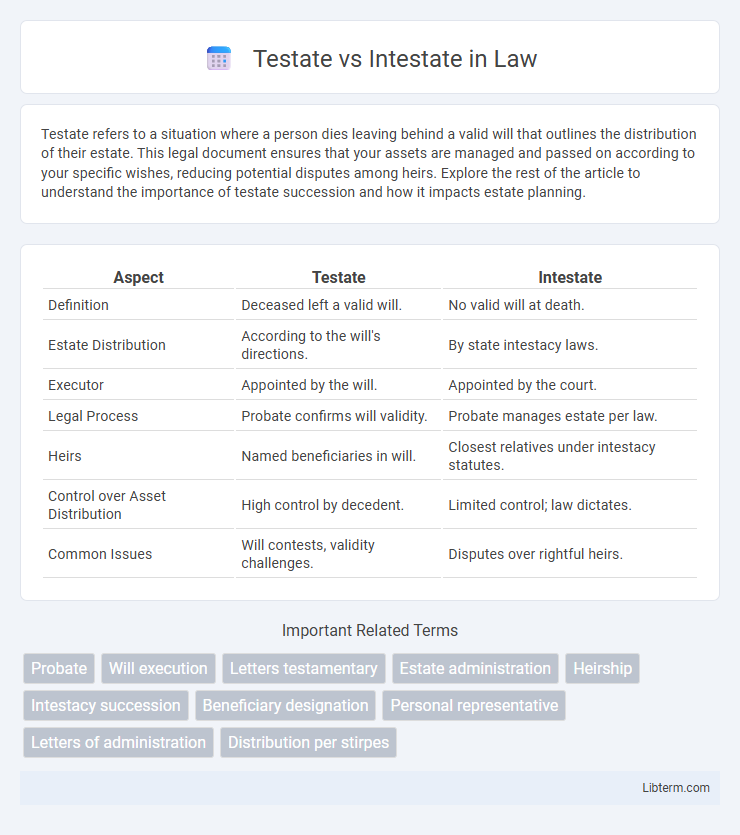Testate refers to a situation where a person dies leaving behind a valid will that outlines the distribution of their estate. This legal document ensures that your assets are managed and passed on according to your specific wishes, reducing potential disputes among heirs. Explore the rest of the article to understand the importance of testate succession and how it impacts estate planning.
Table of Comparison
| Aspect | Testate | Intestate |
|---|---|---|
| Definition | Deceased left a valid will. | No valid will at death. |
| Estate Distribution | According to the will's directions. | By state intestacy laws. |
| Executor | Appointed by the will. | Appointed by the court. |
| Legal Process | Probate confirms will validity. | Probate manages estate per law. |
| Heirs | Named beneficiaries in will. | Closest relatives under intestacy statutes. |
| Control over Asset Distribution | High control by decedent. | Limited control; law dictates. |
| Common Issues | Will contests, validity challenges. | Disputes over rightful heirs. |
Understanding Testate and Intestate: Key Definitions
Testate refers to the condition of a deceased person who has left a valid will specifying how their assets should be distributed. Intestate occurs when someone dies without a legally recognized will, causing state laws to determine the distribution of their estate. Understanding these key definitions is essential for estate planning and probate processes.
The Role of a Will in Testate Succession
A will plays a crucial role in testate succession by clearly outlining the deceased's distribution of assets, thereby ensuring that the estate is handled according to their wishes. It designates executors responsible for managing the estate efficiently and resolving any disputes among heirs, which minimizes legal complications. Without a will, intestate succession laws govern asset distribution, often leading to outcomes that may not reflect the deceased's intentions.
What Happens When Someone Dies Intestate?
When someone dies intestate, meaning without a valid will, their estate is distributed according to state intestacy laws, which prioritize heirs such as spouses, children, and other close relatives. The probate court appoints an administrator to manage and distribute the assets, ensuring debts and taxes are paid before inheritance. This process can lead to delays, increased costs, and potential disputes among surviving family members due to the lack of clear instructions from the deceased.
Legal Requirements for a Valid Will
A valid will must meet specific legal requirements such as being written, signed by the testator, and witnessed by at least two competent individuals to be considered testate. In contrast, intestate cases arise when no valid will exists, triggering state laws to govern asset distribution. Proper adherence to these requirements ensures the decedent's estate is managed according to their wishes, avoiding default state succession rules.
Distribution of Assets: Testate vs. Intestate
Distribution of assets differs significantly between testate and intestate estates. In testate cases, assets are allocated according to the deceased's valid will, ensuring specific bequests to chosen beneficiaries. Intestate estates follow state laws of intestate succession, typically resulting in assets being divided among legal relatives such as spouses, children, or parents based on prescribed statutory shares.
Probate Process in Testate and Intestate Cases
The probate process in testate cases involves validating the decedent's will, appointing the named executor, and distributing assets according to the will's instructions under court supervision. In intestate cases, probate requires the court to appoint an administrator and distribute assets based on statutory intestacy laws, which often results in longer and more complex proceedings. Testate probate typically offers a clearer, faster resolution, whereas intestate probate may lead to disputes and extended delays due to the lack of a valid will.
Rights of Heirs and Beneficiaries
In testate succession, heirs and beneficiaries have clearly defined rights based on the deceased's valid will, ensuring asset distribution aligns with their specified wishes. Intestate succession follows statutory laws, granting heirs automatic rights to inherit according to predefined hierarchies, often prioritizing spouses, children, and close relatives. The absence of a will can lead to disputes and delays, impacting the timely and equitable distribution of estate assets among rightful beneficiaries.
Common Challenges in Testate and Intestate Estates
Testate estates often face the challenge of will contests, where disputes arise over the validity or interpretation of the decedent's will, causing delays in probate proceedings. Intestate estates encounter complexities in identifying rightful heirs under state laws, leading to prolonged administration and potential family conflicts. Both scenarios require meticulous documentation and legal guidance to navigate asset distribution and minimize litigation risks.
Avoiding Intestacy: Importance of Estate Planning
Avoiding intestacy is crucial because dying without a valid will causes state laws to dictate asset distribution, often leading to unintended heirs and family disputes. Proper estate planning ensures clear instructions, minimizes probate delays, and protects beneficiaries' interests. Creating a legally binding will or trust significantly reduces the risk of asset mismanagement and enhances financial security for loved ones.
Choosing the Right Executor or Administrator
Choosing the right executor for a testate estate involves selecting a trustworthy individual named in the will to manage asset distribution according to the deceased's wishes. In intestate cases, an administrator is appointed by the court, often prioritizing close family members to handle estate affairs without a formal will. Effective estate administration requires someone with organizational skills and integrity to navigate legal procedures and ensure timely settlement.
Testate Infographic

 libterm.com
libterm.com